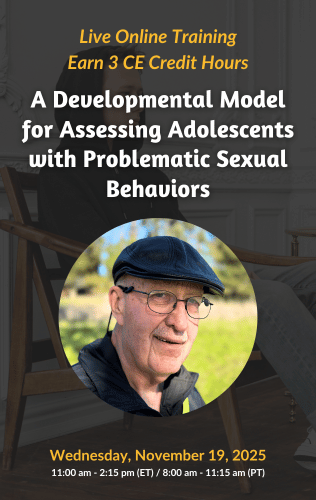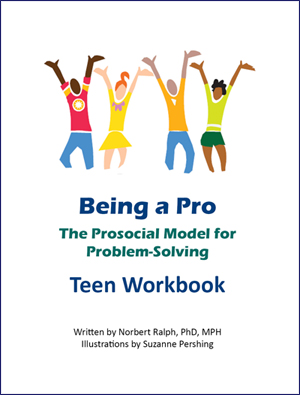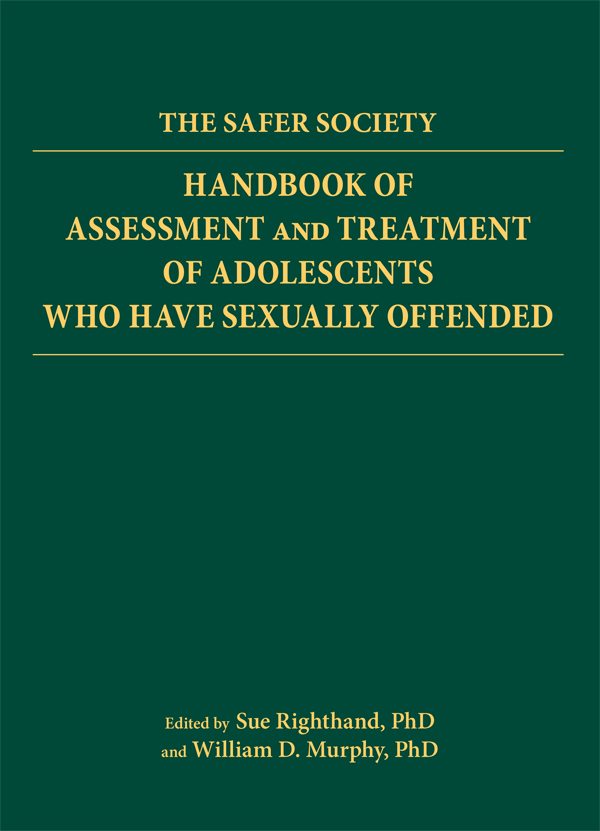Home / Shop / Online Trainings / Trainings
Live Online Training - Developmental Model for Assessing Adolescents with Problematic Sexual Behaviors

- Description
Date: November 19, 2025
Time: 11:00 am – 2:15 pm ET / 8:00 am – 11:15 am PT
Format: Live interactive training offered via Zoom
CE Eligibility: 3 Clinical CE Credit Hours
Presented by: Norbert Ralph, PhD, MPH (See Bio)
You must attend the entire live training and complete an evaluation to be eligible for CE credits. If you seek only psychology credits, the evaluation is optional, and you can remain anonymous.
Online Training Description:
Evaluations of adolescents with problematic sexual behaviors (PSB) often focus on future risk and recidivism, consistent with the  Risk-Need-Responsivity (RNR) model. However, the low base rate of known sexual re-offense and moderate effect size of risk tools limit the accuracy of these assessments. Further, youths with PSB are still very much “works in progress.” Their abilities to anticipate consequences, solve problems effectively, and apply prosocial reasoning are still developing. Therefore, additional assessment methods may help professionals identify the most relevant risk factors and support the establishment of appropriate treatment goals.
Risk-Need-Responsivity (RNR) model. However, the low base rate of known sexual re-offense and moderate effect size of risk tools limit the accuracy of these assessments. Further, youths with PSB are still very much “works in progress.” Their abilities to anticipate consequences, solve problems effectively, and apply prosocial reasoning are still developing. Therefore, additional assessment methods may help professionals identify the most relevant risk factors and support the establishment of appropriate treatment goals.
In this training, Dr. Norbert Ralph presents a developmental model for adolescent assessment, emphasizing factors that disrupt normative, prosocial psychosexual development and highlighting treatable conditions that can reduce risk for repeating problem sexual behaviors. Research has identified several potentially modifiable risk factors, each linked to a threefold increase in recidivism risk:
• ADHD or related disorders
• Mood disorders
• Learning problems
• Abuse or trauma history
• Family conflict
• Sibling conflict
Dr. Ralph outlines best practices, including the structured use of quantitative and qualitative methods, multi-informant data, and alignment with standards from the American Academy of Pediatrics. He illustrates these practices through shared tools and case examples, including assessments of prosocial reasoning and brain development.
Finally, Dr. Ralph discusses the relational aspects of evaluation—working collaboratively with distressed youths and families—and emphasizes the importance of delivering a supportive, informative, and empowering treatment process. Drawing on over 45 years of experience in adolescent assessment, treatment, and research, as well as his expertise in neuropsychology and psychiatric epidemiology, Dr. Ralph demonstrates how these principles apply across diverse settings, from private practice to treatment programs. These practices have also been used to formulate California state guidelines.
As a result of this training, participants will be able to:
1) Explain the shortcomings of assessments that focus only on risk
2) List critical areas of functioning that are risk-relevant and can be modified through treatment
3) Create individualized treatment plans for adolescents who have sexually abused
4) Describe recent research findings of sexual re-offense rates by adolescents
Interactive Follow-Up Meeting
Attendees are invited to join an open discussion 15 minutes following the end of the training, where you can engage with fellow attendees by turning on your camera and microphone. This is an opportunity to share your experiences and contribute to a meaningful exchange of ideas. Time will be allocated to address questions or insights from the training. Please note that attendance is optional and will not affect your eligibility for a training certificate.
We can refund your training fee up to 24 hours prior to the start of the training.
To view all training details and review our list of frequently asked questions, please click here to visit the promotional page.




